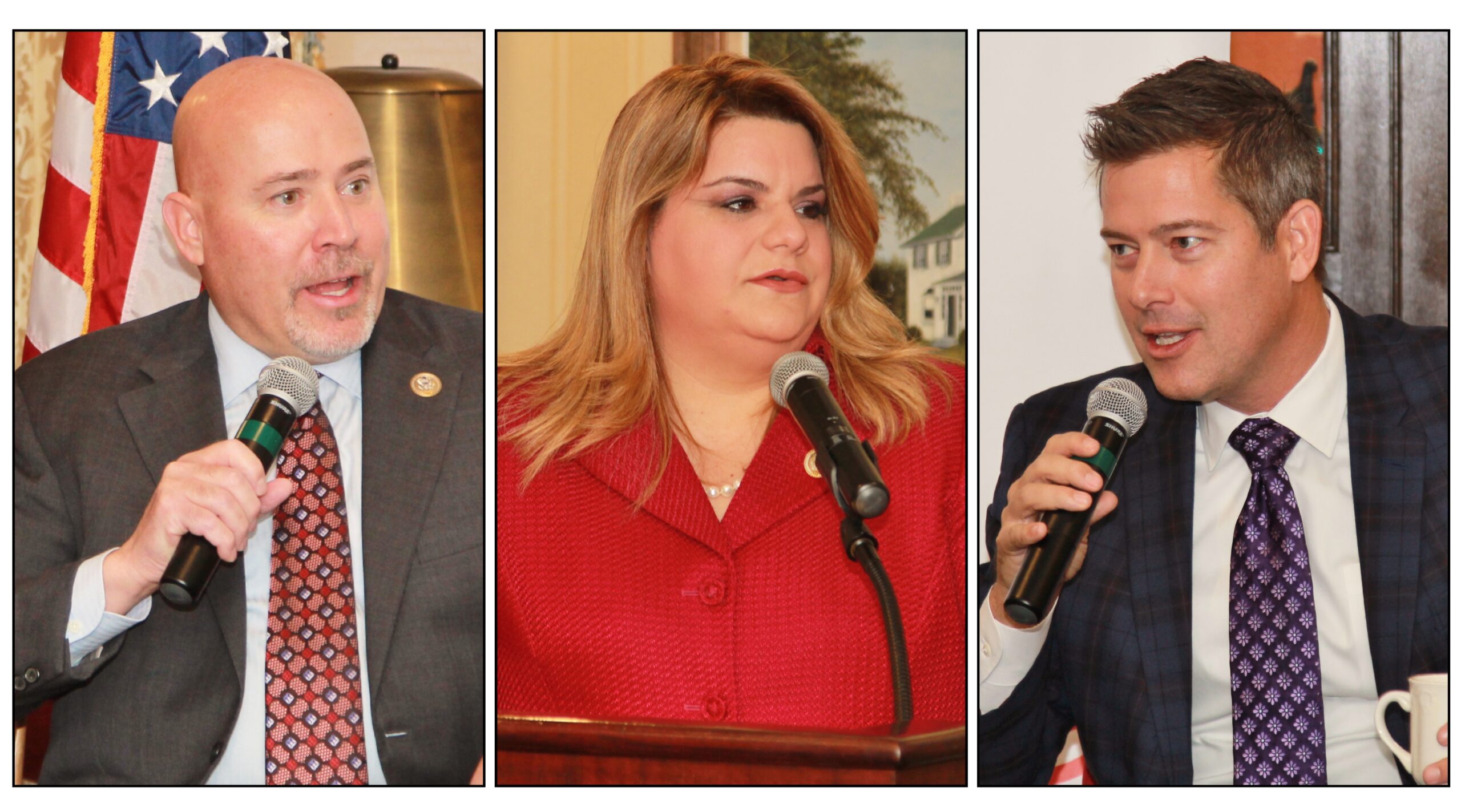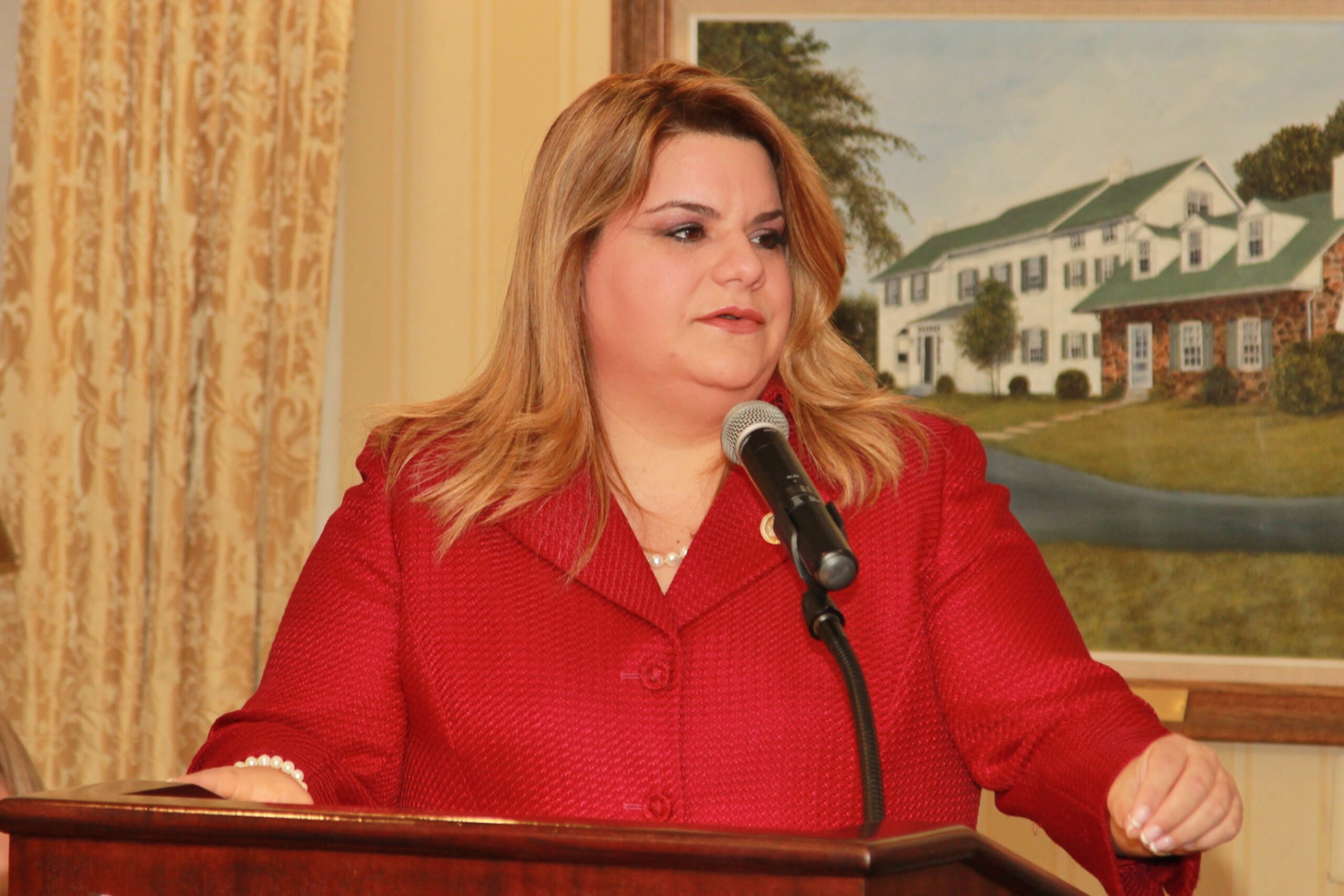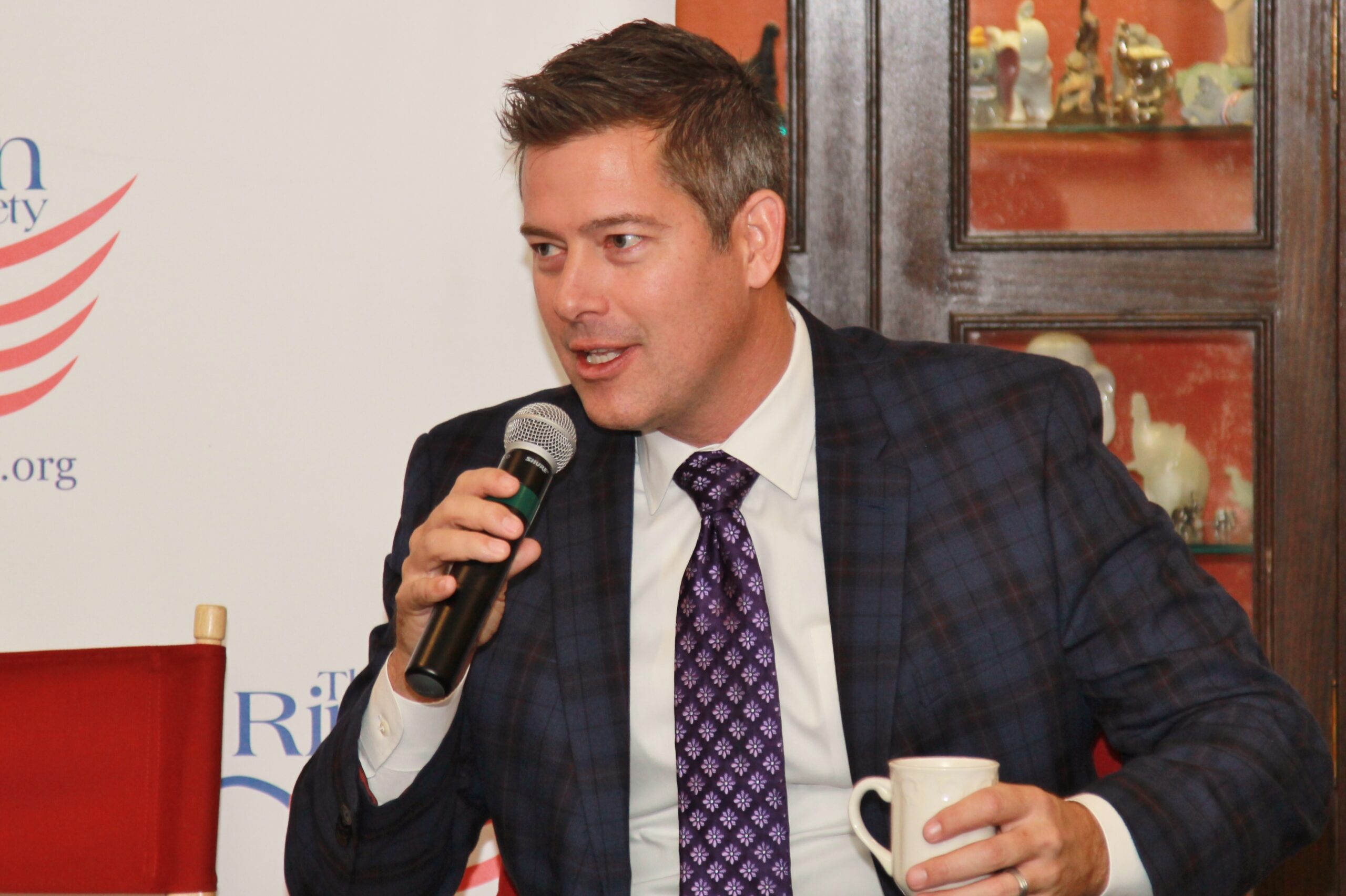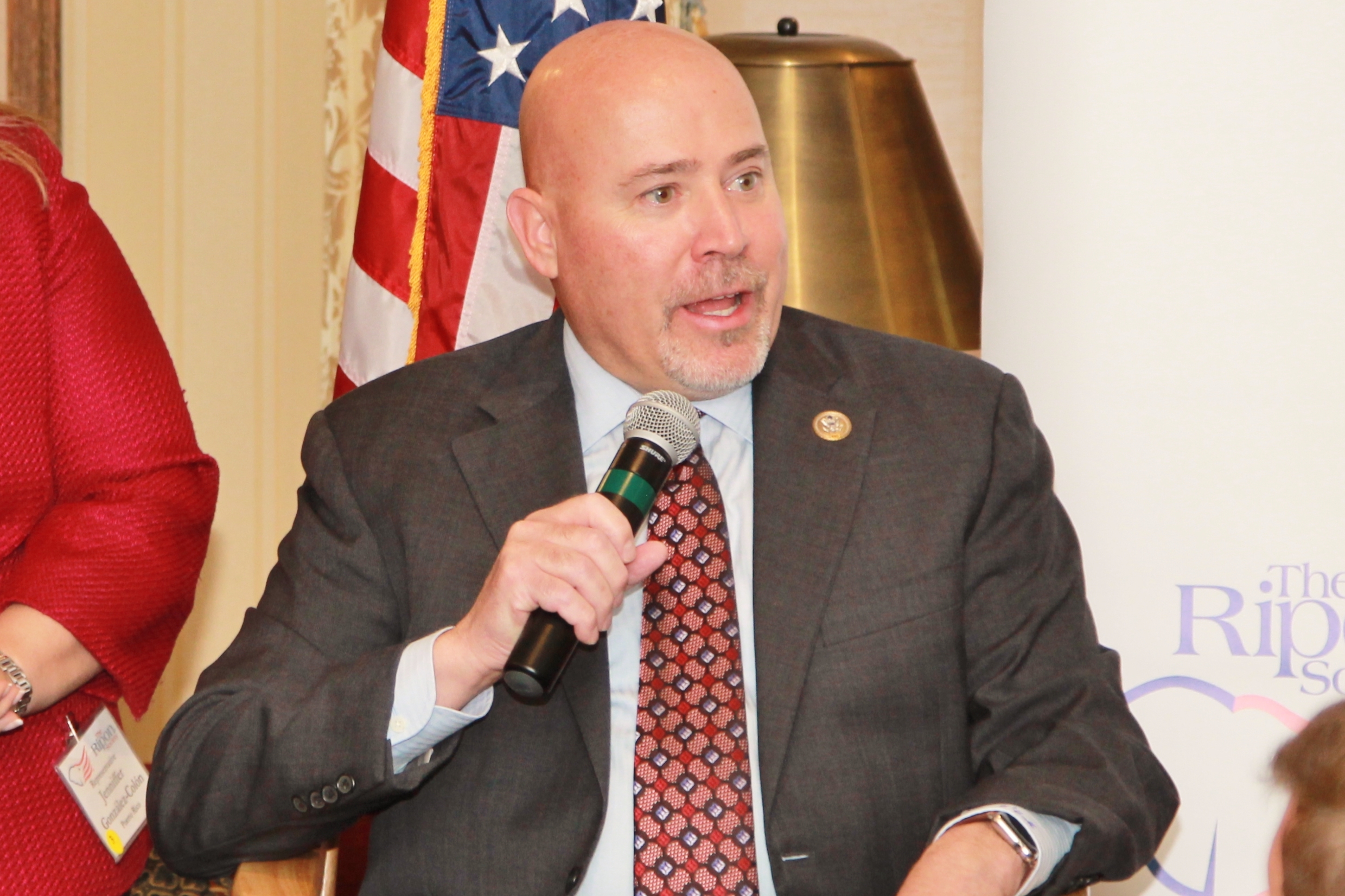 González-Colón, Duffy & MacArthur Lead Effort to Rebuild Puerto Rico in Hurricane’s Wake
González-Colón, Duffy & MacArthur Lead Effort to Rebuild Puerto Rico in Hurricane’s Wake
WASHINGTON, DC – Just over a month after Hurricane Maria devastated Puerto Rico, The Ripon Society held a breakfast discussion on November 2nd with three Members of Congress who are leading the effort to help the U.S. territory recover from the storm and rebuild its economy and infrastructure in the months and years ahead.
The three Members included: Congresswoman Jenniffer González-Colón, who represents Puerto Rico in the House; Congressman Sean Duffy, who represents the 7th District of Wisconsin; and, Congressman Tom MacArthur, who represents the 3rd District of New Jersey. González-Colón kicked off the discussion by recounting her own experience riding out the storm, and how Puerto Ricans have been trying to recover and move forward in the days and weeks since.
“We never experienced a hurricane like that before,” she stated. “I was with my brother. We hid in the closet — not for one hour and not for two hours. It was for more than nine hours, and it was frightening. Well, guess what? We need to move on. We still have more than 70% of the island without power, 29% of the people are without running water, and 20% of the people are without access to an ambulance … I actually don’t have power at my house. So having said that, the challenge after the hurricane is, ‘How are we going to recover?’”

González-Colón was elected to Congress last November, becoming the first woman from Puerto Rico to ever hold that office. She previously served in the Puerto Rico House of Representatives, where she quickly rose through the ranks, becoming Speaker of House in just her third term. In her remarks, she talked about the hurricane’s impact on the island’s economy, and why the main challenge now is: “not to repair the current infrastructure, but to actually rebuild it — and not to the 1960 standards like they are right now. Because we’re going to get hit again. That is the reality — you’re living in the Caribbean.”
“Puerto Rico’s main source of income is not tourism, it’s manufacturing — pharmaceuticals, medical devices, electronics, computers. That means when you have zero revenue because of no power on the island, the already weakened economy is going to get worse. That’s the reason you’re seeing 1,000 Puerto Ricans leave the island daily. I just spoke with the Governor of Florida, Rick Scott, and he told me that more than 84,000 Puerto Ricans left Puerto Rico over the past 42 days. Those are people who are workers — people who are part of the tax base.”
As for the work of FEMA and other efforts by Washington to help the island recover, González-Colón said she was generally pleased with the federal response – for the most part. “We have been receiving funds and we have been receiving help,” she stated, “but we are still shy in some areas. I think the Corps of Engineers was given three tasks. They have been slow in all three. That’s the main concern, but the rest of the agencies have been doing a wonderful job.”
Duffy began his remarks by praising his colleague for her efforts on behalf of the people she represents.
“Puerto Rico is blessed to have her advocacy and hard work,” he said of González-Colón “She is tireless as she works to makes sure that everybody she comes into contact with knows what’s happening in Puerto Rico, and that they care about the people in Puerto Rico.”
The Wisconsin lawmaker then turned his attention to his other colleagues on Capitol Hill. “We have a lot of smart members in the House who care about this issue,” he stated. “This is an opportunity I think for us to look at a place that has not been a beacon of light for free enterprise and streamlined regulations and a great home for capital investment. We have an opportunity to rethink what Puerto Rico’s future is. And how do we as Congress help incentivize growth in Puerto Rico? How do we deal with PREPA? And what leverage do we have to actually extract reform from the Puerto Rican government?
“Anyone who invests on the island… the stories I have heard is that this could take years for people not just from the municipalities, but from the island government to actually get approvals to invest. That’s a horrible place for capital. So we have the opportunity to say, ‘We’ve seen the failure of a big government experiment.’ How great is it for us to then say, ‘What can we do in Congress to actually make this a great home for investment of capital?” What does free enterprise look like in Puerto Rico? I think that’s the challenge and the opportunity that we have right now in Congress to think through these issues.”

Duffy was elected to the House in 2010 and currently serves as Chairman of the Financial Services Subcommittee on Housing and Insurance. He is also the author of legislation, enacted last year, that established a Task Force aimed at helping Puerto Rico overcome its ongoing debt crisis while putting the territory on a path to financial stability. It is a goal, Duffy said, that must not be forgotten in the hurricane’s wake.
“The risk we face is that some want to say, ‘What’s the least amount we can do to get this problem off our back?’ he said, describing the approach that some may have toward Puerto Rico. “I think that’s the wrong approach. I think we have to take this opportunity to say, ‘How big can we go? What kind of vision can we have as a Congress to actually do this the right way?’ And I would just challenge all of you as we think through kind of what’s in the realm of possibility. We need partners, we need friends, we need allies, we need to spitball together as a group of people who care about Puerto Rico to get the best and more innovative and creative ideas flowing, so we can pick what we think is the best and most politically possible options for us to move forward with.”
MacArthur agreed.
“I look at an island with 3.5 million people,” he stated. “3.5 million Americans who can leave at will. And they do — a thousand a day right now. Young people who don’t see a future. They get on a plane and go to Florida. The benefits that they don’t get; for example they don’t get Medicaid benefits in Puerto Rico. They land in Florida, and they become eligible for many things that they don’t get in Puerto Rico. There’s a brain drain underway on this island — that is first and foremost what I see as a problem.
“If Congress doesn’t fix it, it doesn’t go away. We need to fix it, because first, they are Americans – they are part of our country — and secondly, because the problems only get worse and more expensive if we delay. The debt problem is a combination of bonds — government bonds that really can’t be paid — and unfunded pension liabilities. It’s a total of about $125 billion. That’s well above the GDP of Puerto Rico. It’s about $35,000 per person — per man and woman and child. And as people leave, that burden gets higher on those who remain. That is why we had to give them some ability to restructure their debt. They had no legal authority to do it. We had to give them that authority.”
“There’s a fiscal crisis and a business set of issues — and they are separate. The fiscal crisis doesn’t imply that Puerto Rico is a lousy place to do business. There’s actually a thriving business community in Puerto Rico. Half of their economy is manufacturing, as Jenniffer said. Half. It’s shrunk a lot, but there are thriving businesses. I’ve visited Amgen’s plant there, and it’s remarkable what they are doing there on that island that improves our health day today. So we have to deal with both of those issues.”

MacArthur was elected to the House in 2014. A successful businessman before coming to Washington, he served on last year’s Task Force to help Puerto Rico overcome it debt, and continues to believe strongly that a solution to the crisis can – and must – be found.
“Somebody suggested in the last week or so that maybe all that debt should be forgiven,” he said. “That is not a good idea. If you just totally eliminate the debt in Puerto Rico, you’ll never get investment on the island again. Who’s going to buy a bond if the last round of bonds got wiped out? So we have to have an orderly restructuring of debt on Puerto Rico to encourage future investment.”
The New Jersey lawmaker also listed a number of reforms he believed Congress should take up to help the island territory overcome the debt crisis and rebuild after the storm. These reforms include allowing American firms to repatriate their earnings. “If you’re a U.S. company doing business in Puerto Rico and you want to bring your capital home,” MacArthur observed, “you’re treated like your bringing it home from Greece or Russia or some other foreign country. This is U.S. soil, and we should have a free flow of capital which would encourage U.S. businesses to do business there.”
To that end, MacArthur said that he believed that one of the most important reforms Congress could approve with regard to Puerto Rico was to grant it something that González-Colón and others have fought for and long-endorsed – statehood.
“I think long term we really need to look at why we have 3.5 million people in Puerto Rico who are not in a state”, he declared. “That to me… I ran a small company once that was part of AIG. I learned a very important lesson. It was a stand-alone investment holding. Everything we did was different than the parent, and everything was a pain in the neck for the parent. Everything was. It made it very difficult for them to deal with my little company. We ended up spinning it off.
“Puerto Rico is sort of like that. Everything has to be rethought and redone. The tax code, the way Medicaid is handled — so many issues will actually go away if Puerto Rico were a state. There are mostly political issues around that and they can be solved — maybe it’s phased in over time — the representation. But I think ultimately we have to consider why 3.5 million Americans are living sort of a second class existence just off the Florida coast.”
To view the remarks of MacArthur, Duffy and González-Colón before The Ripon Society breakfast discussion, please click on the link below:
The Ripon Society is a public policy organization that was founded in 1962 and takes its name from the town where the Republican Party was born in 1854 – Ripon, Wisconsin. One of the main goals of The Ripon Society is to promote the ideas and principles that have made America great and contributed to the GOP’s success. These ideas include keeping our nation secure, keeping taxes low and having a federal government that is smaller, smarter and more accountable to the people.



